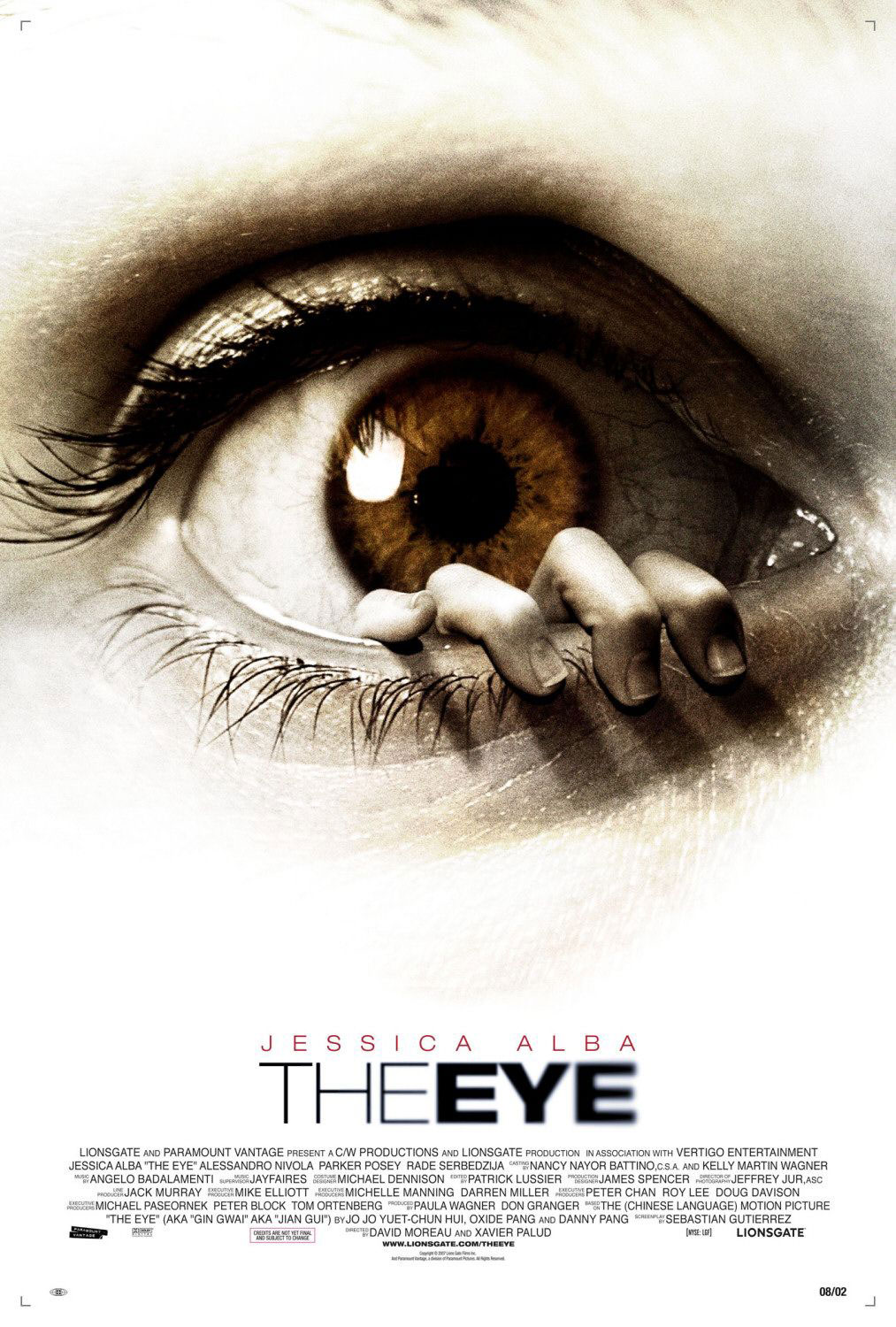I started out this review for a single film, and not two. But, about a half hour into watching The Eye (2008), I realized I couldn’t write a review without first watching The Eye (2002, original title Gin gwai), to see what the filmmakers of the newer version stole from the original. That’s because The Eye is not so much a remake of Gin gwai as it is another version. The only changes are on the surface.
Directed by the Pang Brothers (Danny and Oxide Chun), from a screenplay by the brothers and Yuet-Jan Hui, Gin gwai tells the story of Wong Kar Mun (Angelica Lee). When Mun was a toddler, an accident left her blinded. Now, as an adult, she undergoes cornea transplant surgery to restore her sight. Only, from the moment she first opens her eyes in a Hong Kong hospital, something isn’t right. There appears to be an extra person in the room when the bandages are removed. Her sight is very blurred, so she can’t make out more than a dark figure. It presages troubles to come.
As Mun continues to regain her sight, she sees more strange things. Doctors are convinced that Mun’s brain is just having trouble sifting through all the new visual confusion. Since she has been so long without sight, there is a world of visual cues that she cannot understand, and has to learn. It’s possible that what she’s seeing isn’t anything abnormal, but just seems so to a brain unfamiliar with sight. The most disturbing vision Mun sees, however, is of spectral beings that seem to escort the newly dead into the afterlife. It’s understandable why Mun is skeptical of the diagnoses she’s been getting.
It turns out that the corneas Mun received came from a donor who suffered from the same visions before her suicide. It’s up to Mun, along with her therapist, Dr. Wah (Lawrence Chou), to figure out what supernatural shenanigans are necessary to relieve Mun of this burden.
Along the way, viewers are treated to some very weird filmmaking. Hong Kong was no cinematic backwater, especially in 2002, the year the excellent Infernal Affairs was released. Yet, Gin gwai has a narrative simplicity to it at times that is innocent and childlike. Story arcs are rendered so mundane, predictable, and sappy that they drag down an otherwise good film.
Then the Pangs return to the main plot and everything is made well again. Some nicely creepy things happen to Mun on the way towards denouement. The finale is a huge downer, and the movie treats as a triumphant moment for Mun.
Gin gwai has some very good ideas behind it. The Pangs didn’t fail in their effort to express these ideas, by any stretch, but those ideas don’t feel all that fulfilled, either. More than anything, I think that’s because there are spots in this film that lack sophistication and are hopelessly amateurish.
Still, Gin gwai is better than the rote remake from directors David Moreau and Xavier Palud. The Mun role in The Eye from 2008 was filled by Jessica Alba, and her character’s name is Sydney Wells. Whereas Mun was unemployed and played violin in a small group for blind musicians, Sydney is a fully-fledged professional classical violinist.  She’s motivated and career-minded, and super sweet. She’s so happy and polite about getting her new corneas that I just wanted to strangle her.
She’s motivated and career-minded, and super sweet. She’s so happy and polite about getting her new corneas that I just wanted to strangle her.
Sydney begins suffering the same problems that plagued Mun. And I do mean the same. Instead of stretching their legs, the filmmakers of this Eye chose to reshoot all the stuff that worked in Gin gwai. While I was watching, I could tell that was what they were doing, even though I had yet to see Gin gwai. That’s because, without warning, The Eye would become competent and original, where otherwise it was a mediocre Hollywood experience. I heaped shallow praise on Gin gwai, but it really was quite good in spots, and all those spots ended up in the American production.
Bizarrely, the American filmmakers ditched all the right stuff from Gin gwai, but their replacement filler wasn’t any better, making this version just as uneven as the original. Add in a lead in Alba who has never been all that good at acting, and viewers get a film that should be better than the original, but isn’t.
The Eye was an odd choice for an American version. Hollywood had been making something of a cottage industry out of adapting Asian horror films of the time, so perhaps the producers thought they were in for some easy money. As it turned out, they did make a tidy profit by imitating mediocrity. Their film is shitty, though, which earns it a place in the Watchability Index, at #129, right between Galaxy of Terror and When Time Ran Out. Its neighbors are just as tedious.
